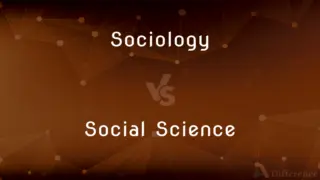Mercy vs. Forgiveness — What's the Difference?
Edited by Tayyaba Rehman — By Fiza Rafique — Updated on October 1, 2023
Mercy is compassion shown to offenders, often by not punishing them, while forgiveness is the act of letting go of resentment or vengeance toward an offender. Both involve leniency, but they stem from different motivations.

Difference Between Mercy and Forgiveness
Table of Contents
ADVERTISEMENT
Key Differences
Mercy and forgiveness are two vital concepts in human relationships, often used interchangeably, but they possess distinct meanings. Mercy refers to showing compassion or leniency, especially towards someone who is in one's power or has done wrong. On the other hand, forgiveness is the intentional act of releasing feelings of resentment or anger towards someone who has harmed or wronged you.
While mercy might be shown by a judge deciding on a lesser sentence for a convict, forgiveness would be a victim choosing to let go of their anger towards their assailant. It is essential to understand that one can show mercy without offering forgiveness. For instance, a ruler might spare a rebel's life out of mercy but may still harbor resentment or mistrust.
Forgiveness, in its essence, is an internal process. It’s a personal choice to overcome feelings of bitterness or the desire for retaliation. Mercy, in contrast, is often external, manifesting in acts of kindness or leniency. A person might forgive their friend for a betrayal, while a teacher might show mercy by giving a student an extension on their assignment.
Furthermore, mercy can sometimes be seen as an act of power or control. A person or entity with authority chooses to withhold punishment. Forgiveness, on the other hand, can be seen as an act of empowerment, where an individual decides, for their own peace, to release negative feelings or grudges.
Comparison Chart
Definition
Compassion shown to wrongdoers
Act of letting go of resentment
ADVERTISEMENT
Nature
Often external
Internal process
Dependent on
Authority or power
Personal choice
Result
Might withhold punishment
Releases resentment
Association
Can be linked to justice or positions of power
Linked to personal healing and reconciliation
Compare with Definitions
Mercy
Leniency in judgment or punishment.
The judge's mercy resulted in a reduced sentence.
Forgiveness
The act of pardoning an offense.
Her forgiveness meant a lot to him.
Mercy
A disposition to be kind or forgiving.
It was out of pure mercy that she helped him.
Forgiveness
Restoration of friendly relations.
Their forgiveness of each other mended their relationship.
Mercy
Compassion shown to someone who has done wrong.
The king showed mercy to the rebel.
Forgiveness
Releasing resentment or anger.
Forgiveness brought her peace.
Mercy
A relief from suffering.
The medicine brought him mercy from the pain.
Forgiveness
Absolving someone from blame.
His sincere apology earned her forgiveness.
Mercy
A blessing or act of divine favor.
Rain in the drought was seen as a mercy from above.
Forgiveness
Forgiveness, in a psychological sense, is the intentional and voluntary process by which one who may initially feel victimized, undergoes a change in feelings and attitude regarding a given offense, and overcomes negative emotions such as resentment and vengeance (however justified it might be). Theorists differ, however, in the extent to which they believe forgiveness also implies replacing the negative emotions with positive attitudes (i.e.
Mercy
Mercy (Middle English, from Anglo-French merci, from Medieval Latin merced-, merces, from Latin, "price paid, wages", from merc-, merxi "merchandise") is benevolence, forgiveness, and kindness in a variety of ethical, religious, social, and legal contexts. In the social and legal context, mercy may refer both to compassionate behavior on the part of those in power (e.g.
Forgiveness
The act of forgiving; pardon.
Mercy
Compassion or forgiveness shown towards someone whom it is within one's power to punish or harm
The boy was screaming and begging for mercy
The mercies of God
Forgiveness
The action of forgiving.
He begged for forgiveness after being caught stealing from the shop.
Mercy
Used in expressions of surprise or fear
‘Mercy me!’ uttered Mrs Diggory
Forgiveness
Readiness to forgive.
Mercy
Compassionate treatment, especially of those under one's power; clemency.
Forgiveness
The act of forgiving; the state of being forgiven; as, the forgiveness of sin or of injuries.
To the Lord our God belong mercies and forgivenesses.
In whom we have . . . the forgiveness of sin.
Mercy
A disposition to be kind and forgiving
A heart full of mercy.
Forgiveness
Disposition to pardon; willingness to forgive.
If thou, Lord, shouldest mark iniquities, O Lord, who shall stand? But there is forgiveness with thee, that thou mayest be feared.
Mercy
Something for which to be thankful; a blessing
It was a mercy that no one was hurt.
Forgiveness
Compassionate feelings that support a willingness to forgive
Mercy
Alleviation of distress; relief
Taking in the refugees was an act of mercy.
Forgiveness
The act of excusing a mistake or offense
Mercy
(uncountable) Relenting; forbearance to cause or allow harm to another.
She took mercy on him and quit embarrassing him.
Forgiveness
A conscious decision to let go of feelings of vengeance.
She chose forgiveness over revenge.
Mercy
(uncountable) Forgiveness or compassion, especially toward those less fortunate.
Have mercy on the poor and assist them if you can.
Mercy
(uncountable) A tendency toward forgiveness, pity, or compassion.
Mercy is one of his many virtues.
Mercy
(countable) Instances of forbearance or forgiveness.
Psalms 40:11 Do not withhold Your tender mercies from me, O Lord
Mercy
(countable) A blessing; something to be thankful for.
It was a mercy that we were not inside when the roof collapsed
Mercy
(uncountable) A children's game in which two players stand opposite with hands grasped and twist each other's arms until one gives in.
Mercy
To feel mercy
Mercy
To show mercy; to pardon or treat leniently because of mercy
Mercy
Expressing surprise or alarm.
Mercy! Look at the state of you!
Mercy
Forbearance to inflict harm under circumstances of provocation, when one has the power to inflict it; compassionate treatment of an offender or adversary; clemency.
Examples of justice must be made for terror to some; examples of mercy for comfort to others.
Mercy
Compassionate treatment of the unfortunate and helpless; sometimes, favor, beneficence.
Mercy
Disposition to exercise compassion or favor; pity; compassion; willingness to spare or to help.
In whom mercy lacketh and is not founden.
Mercy
A blessing regarded as a manifestation of compassion or favor.
The Father of mercies and the God of all comfort.
Mercy
Leniency and compassion shown toward offenders by a person or agency charged with administering justice;
He threw himself on the mercy of the court
Mercy
A disposition to be kind and forgiving;
In those days a wife had to depend on the mercifulness of her husband
Mercy
The feeling that motivates compassion
Mercy
Something for which to be thankful;
It was a mercy we got out alive
Mercy
Alleviation of distress; showing great kindness toward the distressed;
Distributing food and clothing to the flood victims was an act of mercy
Common Curiosities
Are mercy and forgiveness the same thing?
No, mercy is compassion shown to wrongdoers, while forgiveness is releasing resentment.
Do I have to forgive if I show mercy?
No, they are distinct acts. One can show mercy without offering forgiveness.
Who typically shows mercy?
Often, those in positions of power or authority, like judges, show mercy.
Does showing mercy mean condoning wrong actions?
No, it means choosing compassion or leniency, not necessarily agreeing with the act.
How does forgiveness benefit the forgiver?
It can bring peace, reduce stress, and promote healing.
Is forgiveness a sign of weakness?
No, forgiveness can be an act of empowerment and healing.
Is mercy always a choice?
Yes, just like forgiveness, it's a conscious decision.
Does forgiveness mean forgetting?
Not necessarily. One can forgive but still remember the event.
Does mercy always involve withholding punishment?
Often, but not always. It can also mean lessening severity.
Can one show mercy without forgiveness?
Yes, one might act leniently without letting go of resentment.
Who can grant forgiveness?
Anyone who feels wronged or hurt can choose to grant forgiveness.
Can forgiveness be revoked?
Forgiveness is a personal choice, and feelings can change, but true forgiveness is a commitment.
Is forgiveness always immediate?
No, forgiveness is a personal process that can take time.
Why is mercy important in justice systems?
It brings humanity to justice, ensuring punishments are fair and rehabilitative.
Do all religions promote forgiveness?
Most religions advocate for forgiveness, seeing it as virtuous, but interpretations can vary.
Share Your Discovery

Previous Comparison
Panniculus vs. Pannus
Next Comparison
College vs. SchoolAuthor Spotlight
Written by
Fiza RafiqueFiza Rafique is a skilled content writer at AskDifference.com, where she meticulously refines and enhances written pieces. Drawing from her vast editorial expertise, Fiza ensures clarity, accuracy, and precision in every article. Passionate about language, she continually seeks to elevate the quality of content for readers worldwide.
Edited by
Tayyaba RehmanTayyaba Rehman is a distinguished writer, currently serving as a primary contributor to askdifference.com. As a researcher in semantics and etymology, Tayyaba's passion for the complexity of languages and their distinctions has found a perfect home on the platform. Tayyaba delves into the intricacies of language, distinguishing between commonly confused words and phrases, thereby providing clarity for readers worldwide.















































